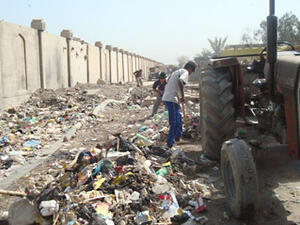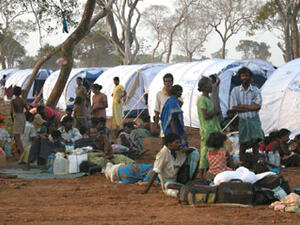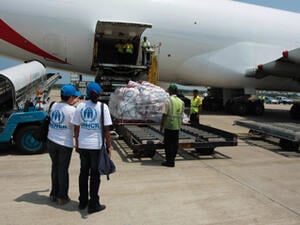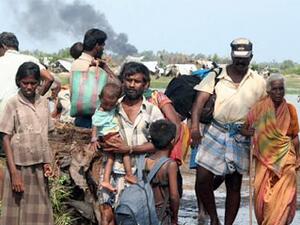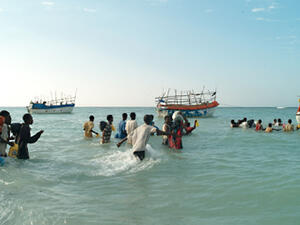UNHCR sees the 2001 Afghan emergency fade into history
UNHCR sees the 2001 Afghan emergency fade into history
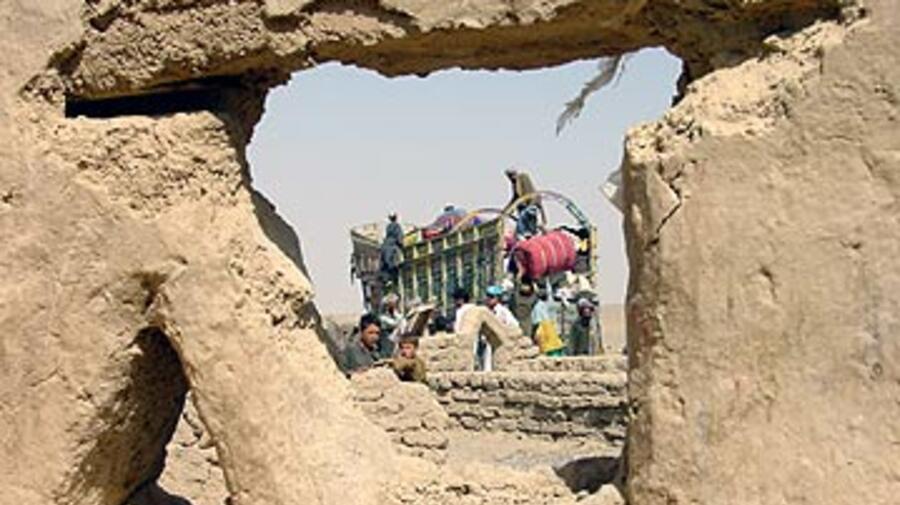
A family packs up to leave Dara 2 camp on the border at Chaman, three years after the last wave of Afghan refugees arrived in Pakistan.
ISLAMABAD, Sept 22 (UNHCR) - Three years after war in Afghanistan unleashed a new wave of refugees toward Pakistan, the UN refugee agency has finally been able to withdraw from the series of emergency camps set up just inside the border of Pakistan.
At the start of the month, UNHCR announced that no refugees were left in the nine "new" camps of North West Frontier province and last Friday it ended operations in the four camps in Chaman on the border of Balochistan. The final step came on Monday, September 20, when UNHCR formally ended support in the "new" camp of Latifabad, which was merged with the nearby older camp of Mohammed Kheil and is now empty.
Earlier this year, UN High Commissioner for Refugees Ruud Lubbers, in consultation with the government of Pakistan, unveiled the plan to wind up the emergency programme that included food for the 2001 arrivals from Afghanistan. UNHCR and the government announced at the beginning of July that camp residents who wished to repatriate would receive an enhanced package of assistance - including three months of food assistance and a tent on their return to Afghanistan.
However, UNHCR and the government emphasised that repatriation was voluntary and no one would be forced back to Afghanistan if they had legitimate fears of returning. A number of refugees are ethnic Pashtuns from northern Afghanistan where the United Nations is continuing efforts to resolve local differences that have blocked repatriation.
By the completion of the plan, half of the refugees in the camps at the start of July have opted to move back to Afghanistan. Some of the remainder have moved themselves to "old" camps - those predating the 2001 emergency - where UNHCR will continue to provide primary education, basic health services, water and sanitation.
"We have been closely watching developments inside Afghanistan since we became refugees in December 2001," said Maulvi Neek Mohammad, who had fled from Kunduz. "Two weeks ago we sent some representatives who met with local authorities in Kunduz and also analyzed the situation on the ground."
"On their return, our people told us things were gradually returning to normal, so now we can make the decision to repatriate. That's the reason we are going back," he said. "It also came at a time when food assistance is going to stop in the camps, so I think this is a good time to go home."
In North West Frontier province, where there were nine "new" camps at the start of the year, 60 percent of the refugees still in the camps at the start of summer - 39,300 Afghans - decided to repatriate. By the end of August, all were empty.
In Balochistan province, where delivery of final food rations to residents had been delayed by local disturbances, the offer of an enhanced repatriation package was extended until September 5 to allow more to benefit. More than 40,000 refugees opted to return - 54 percent of the residents of Chaman and 36 percent of those in all "new" camps in the province.
The provision of emergency medical assistance and water supplies was then further extended in the four Chaman camps to let residents register for the option of relocation by UNHCR to Mohammed Kheil, which was further from the unstable frontier.
Residents of Mohammed Kheil, which had been classed as a "new" camp because it housed both 2001 and earlier refugees, will receive the same assistance as other "old" camps in Pakistan. However, no refugees opted for the relocation during the three-day registration period.
Some refugees preferred to stay near the border where there are greater chances for work, some earlier registrations were uncovered as duplicates and many refugees from Chaman moved to old camps that are less isolated than Mohammed Kheil.
Understandably, many refugees objected to the end of the extra assistance initiated for the 2001 arrivals - especially monthly food rations. But UNHCR felt there was no further justification for them receiving more support than refugees living in the nearly 200 "old" camps scattered across the border provinces of Pakistan.
The emergency camps, always intended to be short-term, were located in isolated sites where it was difficult and expensive to provide assistance. Several depended on continuous arrivals of water tankers. In addition, there was growing concern about the camps' proximity to the porous border at a time of serious unrest in adjoining areas of Afghanistan.
"I am going on my own to an old camp called Saranan," said Sakhi Dost, a former resident of the northern Afghan province of Jawzjan, who had been living in the Chaman camp of Dara 2 since early 2002 and decided not to repatriate yet.
"I have talked to my family and other people and we decided that we cannot move to Mohammed Kheil camp. And now that the assistance is ending in Chaman camps we are going to the old camp where I have a relative who has offered to share his house with my family."
The end of the "new" camps still leaves about a million refugees living in earlier camps established to house the waves of refugees that began with the Soviet invasion of Afghanistan in 1979. Subsequent civil war triggered further exoduses. An unknown, but substantial number, of Afghans also live in Pakistan's cities beyond the reach of UNHCR assistance.

An Afghan boy stands amid the ruins of the mud houses dismantled as refugees leave Landi Karez camp at Chaman.
Although the enhanced package of repatriation aid offered to residents of the "new" camps during the summer is no longer available, UNHCR continues to assist all Afghans in Pakistan who wish to go home under the normal repatriation programme. That includes a travel grant ranging from $3 to $30, depending on the distance home, and $8 per person to assist in reintegration in Afghanistan.
More than 2.26 million Afghans have returned from Pakistan since the programme began in March 2002, including 360,000 so far this year. A further half million are expected to repatriate next year under the programme, which is governed by a Tripartite Agreement between UNHCR and the governments of Afghanistan and Pakistan that runs until March 2006.
By Jack Redden
UNHCR Pakistan



